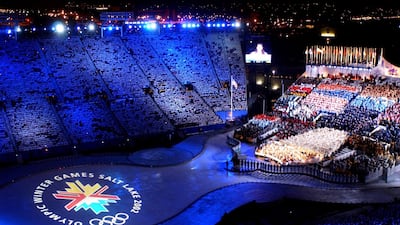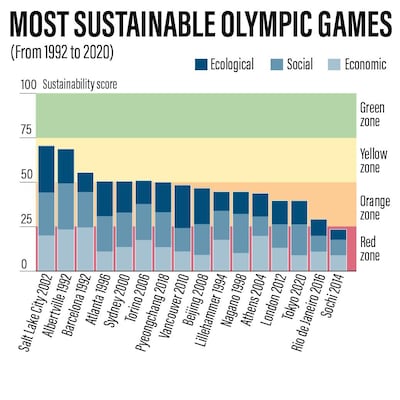The Olympic Games should be limited to a small number of host cities and be dramatically cut in size to limit the environmental and social effects of the urban mega-projects, research found.
Spiralling costs, abandoned venues, the mass movement of people and ecological damage have all contributed to the failure of the Olympics to live up to its bold claim of displaying the best of sustainable multi-billion-dollar developments, the first study of its kind concluded.
Since the most sustainable Games of those examined in Salt Lake City in 2002, host cities have experienced declining success in areas such as improving the lives of local people and limiting the cost to the environment, research published in Nature Sustainability revealed.
Researchers found that the Sochi Winter Games of 2014 were the least successful in promoting the sustainability agenda enshrined in the contract between host cities and Olympic organisers. Rio de Janeiro in 2016 ranked the lowest of the summer Games because of added costs, subsequent disuse of sports venues and the displacement of some city residents.
“This falls short of the humanist ideals of the Olympics to be a force for progress and improvement – for humanity and for the planet,” the study said.
The Olympic Games have dramatically increased in size and cost over the decades. Half of the global population is expected to watch the Tokyo Games this year, an event projected to cost up to $28 billion.
Despite the huge costs, governments are keen to host the multi-sports event because of potential investment opportunities and international prestige.
But the researchers from Switzerland and the US said hosts were failing to take advantage of the global attention to address challenges in an age of rapid urbanisation.
They called for cuts in spectator numbers to reduce the size of venues, an independent monitoring body to gauge the impact of the Games, and a limited number of host cities.
They examined 16 summer and winter Olympics from 1992 to the current Tokyo Games that cost a combined $70 billion. They ranked each event for its sustainability – its ecological footprint, effects on social justice and economic efficiency.
The Games overall scored only a ‘medium’ grade because of the high costs involved and the failure to re-use venues and facilities after athletes departed.
Provisional data showed the third lowest-ranked host city in terms of sustainability was Tokyo, which is due to host the Games this summer after last year’s event was postponed because of Covid-19.
Barcelona 1992 was the highest-scoring summer Games, while some of the countries that marketed themselves as sustainable models – such as Vancouver 2010 and London 2012 – ranked below average.
Opinion is divided among academics who believe such huge events can never be sustainable and others who see its staging as an opportunity to push innovative solutions for modern urban living.
“The stakeholders of the Olympic Games paint them as paragons of sustainability. Our analysis reveals that this is not the case,” the study said.
“The power of the Olympic spectacle is not currently harnessed to transform unsustainable modes of global economic production, but to entrench them.”


















